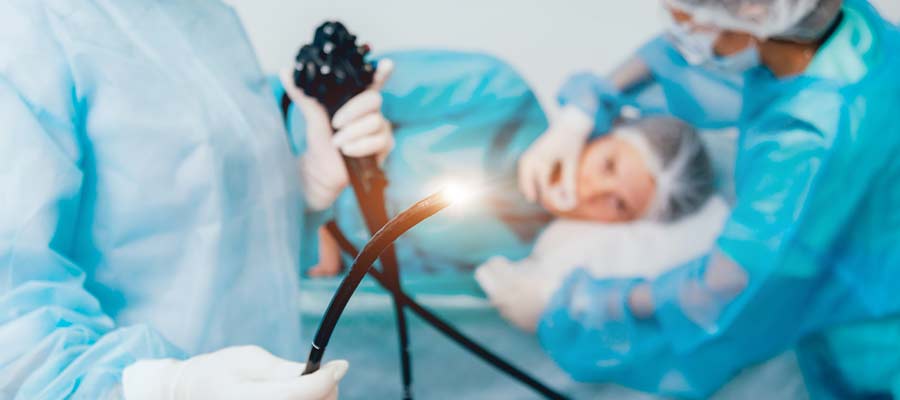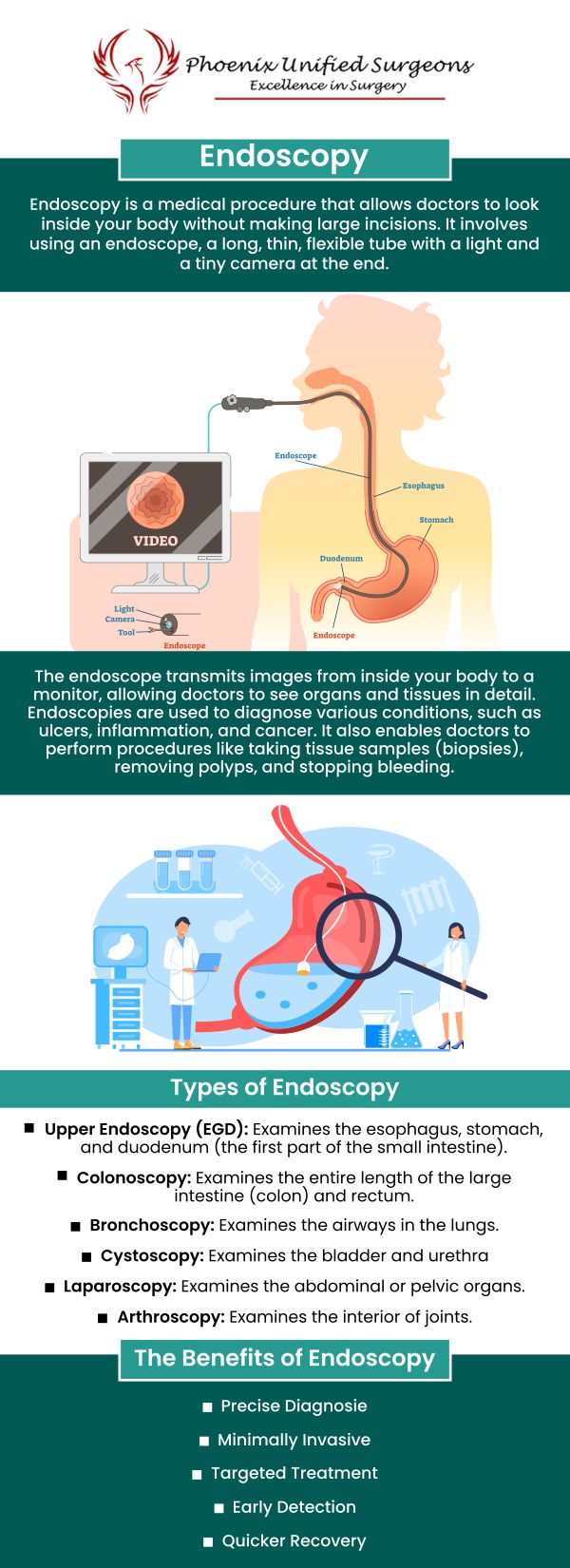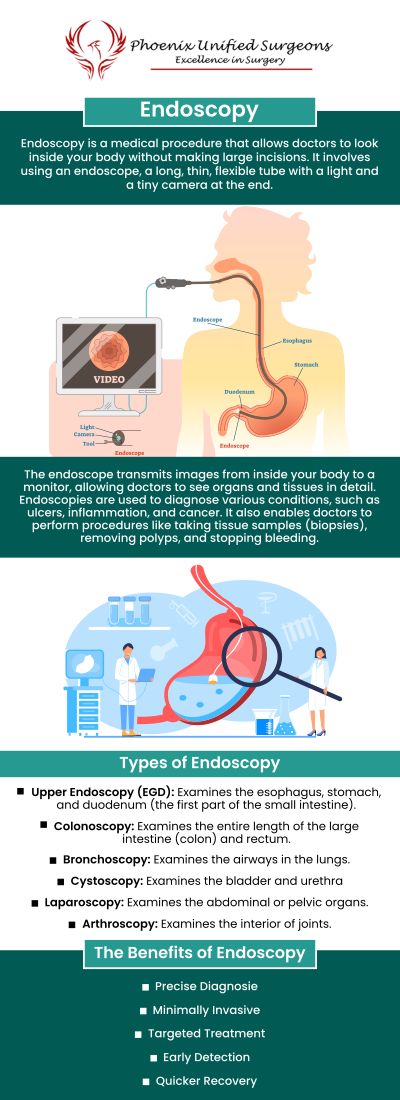How an Endoscopy Helps to Diagnose Your Gastrointestinal Condition
An endoscopy is a vital procedure for diagnosing gastrointestinal conditions, allowing physicians to visually inspect the digestive tract and identify issues such as inflammation, ulcers, or tumors. Offering advanced diagnostic services to accurately assess and manage your digestive health. To learn more about this minimally invasive procedure, consult Dr. Antonino Cammarata D.O., at Phoenix Unified Surgeons. For more information, contact us or request an appointment online. We are conveniently located at 20333 N 19th Avenue, Ste 230 Phoenix, AZ 85027.




Table of Contents:
What is an endoscopy, and how does it diagnose gastrointestinal conditions?
What gastrointestinal conditions can be detected with an endoscopy?
Can an endoscopy differentiate between IBS and other digestive disorders?
What are the limitations of an endoscopy in diagnosing gastrointestinal conditions?
Endoscopy is a minimally invasive technique that allows our skilled surgeons to examine the inside of a patient’s body with precision and clarity. Using a state-of-the-art endoscope—an advanced, flexible instrument equipped with a high-definition camera and light—our team can thoroughly evaluate the interior surfaces of organs and tissues.
Endoscopy is particularly valuable for diagnosing and managing gastrointestinal conditions. Our patients who experience symptoms such as persistent abdominal pain, chronic heartburn, unexplained bleeding, or changes in bowel habits benefit greatly from this procedure. It enables us to directly observe the esophagus, stomach, and the initial section of the small intestine, facilitating the identification of issues like inflammation, ulcers, tumors, or precancerous growths.
Additionally, endoscopy at Phoenix Unified Surgeons allows for the collection of tissue samples (biopsies), which are crucial for the diagnosis of conditions such as celiac disease, gastrointestinal cancers, and infections, and for assessing the severity of disorders like gastroesophageal reflux disease (GERD) and Crohn’s disease.
At Phoenix Unified Surgeons, we are committed to providing comprehensive care with minimal risk and discomfort. Our expertise in endoscopy reflects our dedication to offering reliable and effective diagnostic solutions for a wide range of gastrointestinal disorders, ensuring our patients receive the best possible outcomes.
Endoscopy is a procedure that allows our skilled surgeons to diagnose and manage a variety of gastrointestinal conditions with precision and accuracy.
Endoscopy enables our team to directly visualize the inner lining of the digestive tract, providing clear insights into conditions like gastroesophageal reflux disease (GERD). By identifying inflammation or damage to the esophagus, we can tailor treatment plans to alleviate symptoms and prevent further complications. Our expertise in endoscopy also extends to diagnosing peptic ulcers, where we can detect and address open sores in the stomach or upper small intestine, offering relief and promoting healing for our patients.
Celiac disease, an autoimmune disorder triggered by gluten, is another condition we can diagnose through endoscopy by performing small intestine biopsies. Our commitment to early detection and prevention is further demonstrated in our ability to identify Barrett’s esophagus, a condition associated with increased esophageal cancer risk, allowing us to implement proactive monitoring and interventions.
At Phoenix Unified Surgeons, we also utilize endoscopy to detect various types of gastrointestinal cancers, including esophageal, stomach, and colorectal cancers. By enabling tissue sampling for biopsy, we ensure accurate diagnoses and timely treatment plans. The detection and removal of polyps during endoscopy are crucial in preventing the progression of colorectal cancer, a service we provide with utmost care and expertise.
For patients with inflammatory bowel diseases like Crohn’s disease and ulcerative colitis, endoscopy is a powerful diagnostic tool that allows us to observe inflammation and other characteristic changes, guiding effective treatment strategies. Additionally, we use endoscopy to identify infections such as Helicobacter pylori, which is linked to peptic ulcers and some gastric cancers, ensuring comprehensive management and improved patient outcomes.
Endoscopy involves using a thin, flexible tube equipped with a camera, allowing our experts to visualize the interior lining of the gastrointestinal tract.
While endoscopy is invaluable for identifying structural issues such as ulcers, inflammation, tumors, or conditions like celiac disease, it has limitations in diagnosing functional disorders such as Irritable Bowel Syndrome (IBS). IBS, characterized by symptoms like abdominal pain, bloating, and altered bowel habits, does not cause visible structural changes, making it challenging to diagnose through endoscopy alone.
At Phoenix Unified Surgeons, we use endoscopy to exclude other conditions that mimic IBS symptoms. This includes ruling out inflammatory bowel diseases (IBD) like Crohn’s disease and ulcerative colitis, which do present with visible inflammation and structural changes in the bowel lining. Additionally, endoscopy can identify conditions such as peptic ulcers or gastroesophageal reflux disease (GERD), which may have overlapping symptoms with IBS.
When endoscopy results show no abnormalities and other diagnostic tests are negative, our team of experts may consider a diagnosis of IBS based on symptom patterns and the exclusion of other conditions. We then focus on managing and treating IBS through a personalized approach tailored to each patient’s needs.
Endoscopy allows our specialists to obtain direct visualization of the digestive tract, which is essential for accurate diagnosis and treatment planning. However, we also understand the limitations of this procedure and strive to provide comprehensive care that addresses these challenges.
One of the primary limitations of endoscopy is its focus on the mucosal surface of the gastrointestinal tract. At Phoenix Unified Surgeons, we employ advanced imaging techniques and collaborate with radiologists to complement endoscopic findings, particularly for abnormalities located deeper within the walls or outside the gastrointestinal tract. This multidisciplinary approach ensures that conditions such as small tumors or lesions, which may not protrude into the lumen, are not overlooked.
Understanding that endoscopy may not effectively evaluate motility disorders, our practice integrates functional studies when necessary. These assessments help us understand the movement of the gastrointestinal tract, providing a more complete picture of conditions that may not be visible through structural examination alone.
Additionally, for conditions like microscopic colitis that require histological examination, our team is equipped to perform biopsies during the endoscopy to ensure accurate diagnosis. This capability allows us to detect microscopic inflammation or cellular changes that may otherwise go unnoticed.
Recognizing the limitations in accessing certain areas of the gastrointestinal tract, such as the distal small intestine, we offer alternative procedures like capsule endoscopy and enteroscopy. These options allow us to overcome the constraints of traditional endoscopy and provide a thorough evaluation when necessary.
While endoscopy is generally safe, we prioritize patient safety by carefully evaluating individual risks, particularly for those with significant comorbidities or high-risk profiles. Our surgeons are skilled in minimizing potential complications, such as bleeding, perforation, and adverse reactions to sedation, ensuring a safe experience for all patients. For more information, contact us or request an appointment online. We are conveniently located at 20333 N 19th Avenue, Ste 230 Phoenix, AZ 85027. We serve patients from Phoenix AZ, Sun City AZ, Peoria AZ, Surprise AZ, Glendale AZ, Scottsdale AZ, and surrounding areas.
Check Out Our 5 Star Reviews



Additional Services You May Need
▸ Colon & Rectal Surgery
▸ Gallbladder Surgery
▸ Colonoscopy
▸ Wound Care
▸ Hernia Repair
▸ General Surgery
▸ Robotic and Minimally Invasive Surgery
▸ Appendectomy
▸ Colon Repair/Resection
▸ Lipoma & Cyst Removal
▸ Endoscopy and Colonoscopy
▸ Abdominal Pain
▸ Colon surgery for Diverticulitis
▸ Colon surgery for Colon Cancer
▸ Hemorrhoids
▸ Anal Fistulas
▸ Anal Pain Surgeries
▸ Colostomy Avoidance Surgery
▸ Fecal Incontinence Surgery
▸ Crohn’s Surgery
▸ Ulcerative Colitis Surgery






